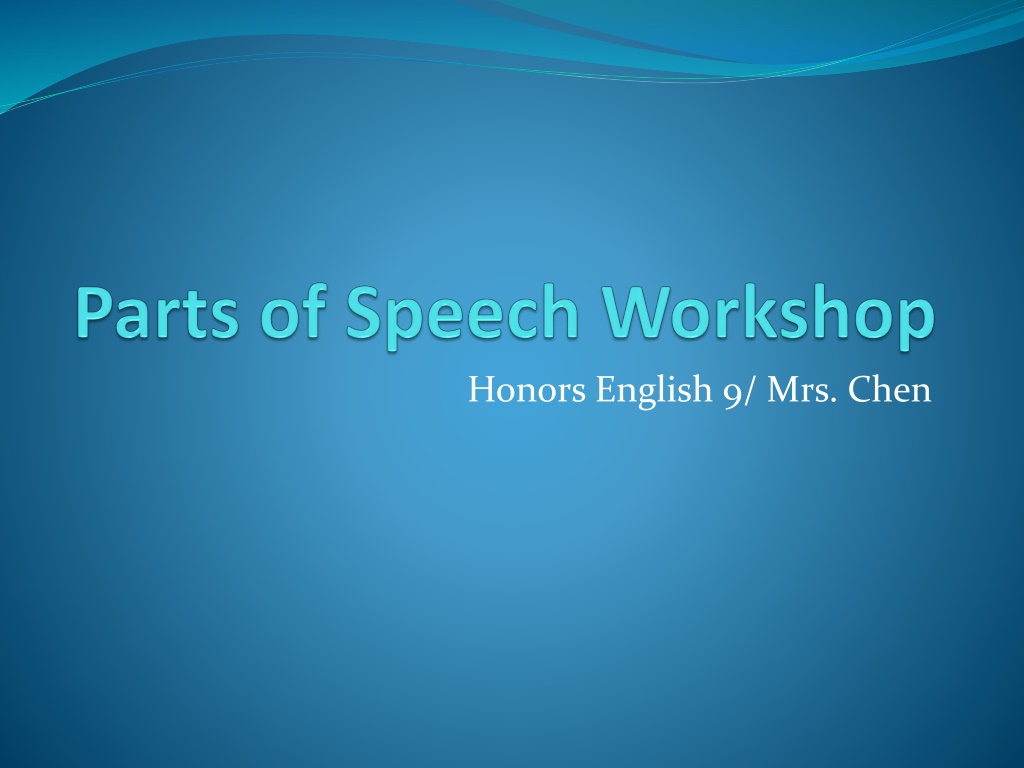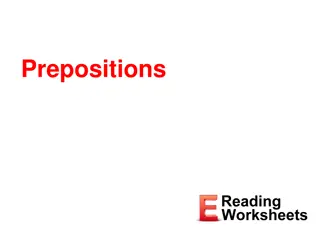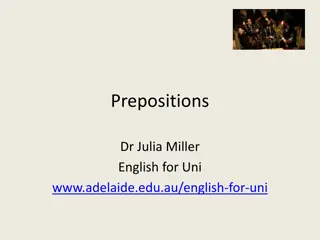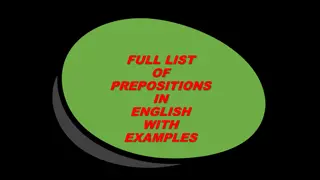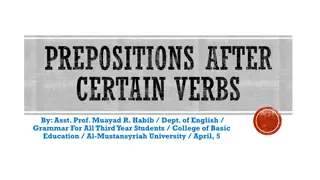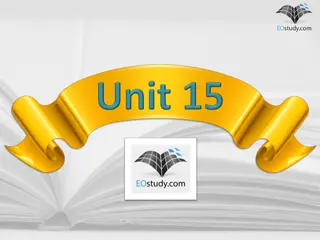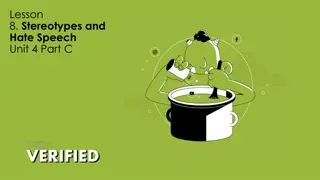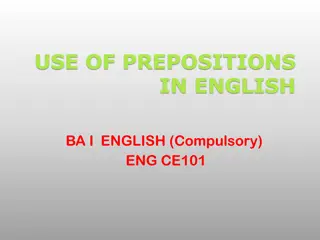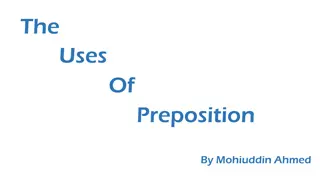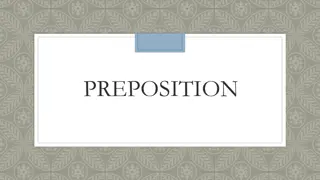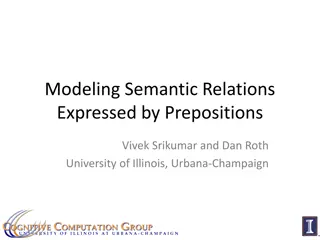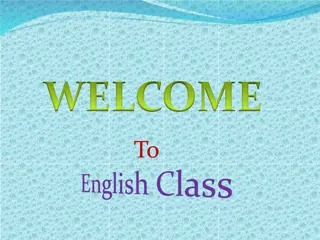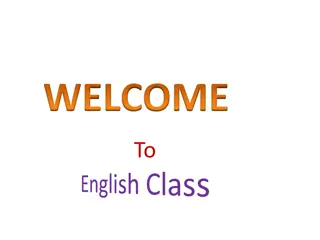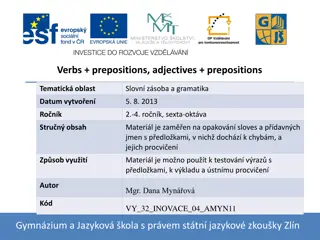Understanding Prepositions and Parts of Speech in English Grammar
Learn about prepositions and their role in connecting nouns, pronouns, and phrases to other words in a sentence. Explore the difference between adverbs and prepositions, identify common prepositions, and understand how to identify subjects and verbs by recognizing prepositional phrases. Discover the definition of a noun and distinguish between concrete and abstract nouns. Dive into a preposition poem and enhance your knowledge of English grammar fundamentals.
Uploaded on Sep 28, 2024 | 0 Views
Download Presentation

Please find below an Image/Link to download the presentation.
The content on the website is provided AS IS for your information and personal use only. It may not be sold, licensed, or shared on other websites without obtaining consent from the author. Download presentation by click this link. If you encounter any issues during the download, it is possible that the publisher has removed the file from their server.
E N D
Presentation Transcript
What is a Preposition? A preposition links nouns, pronounsand phrases to other words in a sentence. The word or phrase that the preposition introduces is called the objectof the preposition. e.g. The book is on the table. The book is beneath the table. She read the book during class. 2
Common prep. & compound prep. Preposition Words 3
Adverb or preposition? Difference: Adverb answers the questions, Where? When? How? To what extent? by itself. Prepositions (both common and compound prepositions need more than just themselves to answer the same questions. e.g. He fell down. (Down is a(n) _____ because it takes only one word to tell where he fell.) He fell down the stairs. (Down is a(an) ____ because it takes more than a single word to tell where he fell.) 4
Your turn to label the Parts of Speech: They walked aboard. They walked aboard the ship. * Summary: A common preposition is a word that shows the relationship between a noun or a pronoun and another word in the sentence. 5
Preposition poem Through the dark wet mists, Beside the rushing river, Into gigantic, beautiful trees, Close to toucans and big, wet leaves, We got lost in the rain forest. 6
*Prepositional phrases will not be the subject or verb of the sentence. How to look for subjects? After crossing out all prepositional phrases, find who or what the sentence is about. e.g. The man with his son walked toward me. How to look for verbs? After finding the subject of the sentence, decide what happened or what is in the sentence. Remember: the verb will never be in a prepositional phrase. e.g. A book of stamps lay on the table. 7
What is a Noun? A noun names a person, a place, or a thing. Concrete nouns usually can be seen: book, car, chair, hammer, towel, store Abstract nouns are those that cannot be seen: love, liberty, grace, sadness * atom, air, wind, breath 8
Game: Put the nouns in the correct basket. Concrete Nouns Abstract Nouns 9
Identify a Noun through Determiners: Articles: a, an, and the will come before a noun and sometimes a pronoun. The noun may have another word in front of it, but a noun will be in the vicinity of a, an, and the. e.g. a book, the movie, an orange, a lovely scene Demonstrative: this, that, those, these, MAY be signals for a noun to follow. However, sometimes they stand alone. e.g. this book, that light, those buttons, these cars *This is fun. I like those. (This and Those stand alone.) 10
Identify a Noun through Determiners (2) Numbers: numbers come before nouns. Describing words often come between the number and the noun. e.g. fifty-one people seven white ducklings * If a number does NOT have a person, place, or thing after it, the number will NOT serve as a determiner for a noun. e.g. Three stayed behind. 11
Identify a Noun through Determiners (3) Possessive Pronouns (used as adjective determiners):my, his, her, our, their, its, your often signal a noun. They come before a noun. e.g. my hair your key our new radio Possessive Nouns: often signal other nouns. They come before nouns. e.g. Craig s house visitor s parking 12
Identify a Noun through Determiners (4) Indefinites: some, any, no, many, few, several come before nouns. A describing word may fall between an indefinite and the noun. e.g. Some sharp knives were lying on the counter. * Some of the newspapers were thrown away. Some of the newspapers were thrown away. 13
Another Way to Classify Nouns A common noun names any person, place, or thing e.g. basketball, video, wizard, coin, woman, and coach A proper noun names a particular person, place, or thing and begins with a capital letter. e.g. Winston Churchill, Babe Ruth, Mr. Richard Turner, and Chicago. Common Nouns Proper Nouns hospital Mercy General Hospital woman Martha Washington school Sayville Middle School newspaper The New York Times 14
Another Way to Classify Nouns (2) Collective Noun Compound Noun A compound noun is a noun consisting of more than a single word. It could be separate words: social studies, physical education, and dinning room. It could be two words joined by a hyphen: merry-go-round, thirty-three, sister-in-law, and great- grandmother. It could be a combined word: schoolteacher, bookkeepr,landlord, and headmaster. A collective noun names a group of people or things. Examples of collective nouns are : jury, herd, flock, family, fleet, club, class, and group. 15
What is a Pronoun? A pronoun is a word used in place of one or more nouns. Personal Pron. Pron. Pron. Reflective Interrogative Demonstrative Pron. Indefinite Pron. 1st person: I, my, mine, me; we, our, ours, us 2nd person: you, your, yours 3rd person: he, his, him, she, her, hers, it, its; they, their, theirs, them *is formed by adding self or selves to certain personal pronouns e.g. myself, himself, ourselves (!) There is NO words like hisself or theirselves *is used to ask questions e.g. which, who, whom, and whose *is used to point out a specific or definite person or thing e.g. this, that, these, and those *often does not refer to a specific person or thing e.g. all, each, more, one, another, either, most, other, any, everybody, neither, some, anyone, both, etc. 16
Lets Practice Personal Pronouns: Complete the following table. Singular Plural First person (the person speaking) Second person (the person spoken to) Third person (some other person or thing) 17
What is a Conjunction? A conjunction connects words or group of words. There are three types of conjunctions: Coordinating conjunction: a single connecting word. Remember FANBOYS (For, And, Nor, But, Or, Yet, So). Correlative conjunction: pairs of connecting words. These five pairs are both/and, either/or, neither/nor, not only/but also, and whether/or. Subordinating conjunction: a connecting word used before the adverb clauses, such as after, although, as, because, before, even though, if, in order, since, so that, that, though, unless, until, where, whether, while. 18
Quick Write: use these coordinating and correlative conjunctions in your own sentences: 1. Use neither nor: 2. Use but: 3. Use for: 4. Use or: 5. Use either or: 19
What is an Interjection? An interjection is a word that expresses strong feeling or emotion: 1. An interjection usually comes at the beginning of the sentence. 2. An interjection is often followed by an exclamation point (!) when the emotion is strong or a comma (,) when the emotion is mild. 3. Do not overuse interjections. Include one when you want to make your point. If you use too many interjections, your writing loses its power and effectiveness. 20
Here are some common interjections: Aw Bravo Darn Dear me Eek Eh Gee Golly Goodness gracious Horrors Goah Hallelujah Hey Hurrah Hurray Mmm Oh Oh no Oops Ouch Phew Rats Really Ugh Well Whoa Whoops Wow Yea Yeh Yes Yippee 21
What is an adjective? An adjective modifies (qualifies or limits the meaning of) a noun or a pronoun. It answers the questions, What kind? Which one(s)? How many? How much? e.g. Carrie read an interesting story. (What kind of story?) The recent article has that information. (Which article?) Kent owns those surfboards. (Which surfboards?) Wendy paid fifty dollars for the jacket. (How many dollars?) Much space was devoted to her artwork. (How much space?) 22
Where to find adjectives in a sentence? An adjective normally comes before a noun, but after an indefinite pronoun. e.g. Italian bread, black-and-blue mark, intelligent coaches; something important, anyone valuable, etc. * Do NOT use a hyphen after an adverb ending in ly. e.g. newly painted mural, sickly sweet odor, recently purchased ** A, an, and the are normally used as adjectives, even though they are called Articles. 23
What is an adverb? An adverb is a word that modifies (qualifies or limits) a verb, an adjective, or another adverb. 1. Many adverbs end in ly. 2. Adverbs answer any of these four questions: Where? When? How? To what extent? 3. Adverbs make writing more specific and more exact. 4. Some adverbs do not end in ly: again, always, just, nowhere, seldom, soon, very, almost, away, later, often, so, then, alone, even, never, perhaps, sometimes, there, yet, already, somewhat, quite, also, here, rather, now, too, somewhere, today, yesterday, etc. 24
Adverbs in Sentences Adverbs Modify Verbs Adverbs Modify Adjectives Adverbs Modify other Adverbs 1. John ate quickly. (How did he eat?) 2. I walk there. (Where did I walk?) 3. Ashleigh will eat soon. (When will Ashleigh eat?) 1. Rex is very happy. (Very modifies the adjective happy and answers the question, To what extent?) 2. The program was too unrealistic. (Too modifies the adjective unrealistic and answers the question, To what extent?) 1. Warren walks too quickly. (Too modifies the adverb quickly and answers the question, How quickly?) 2. He moved rather recently. (Rather modifies the adverb recently and answers the question, How recently?) 25
Practice: Adverb or Adjective? Identify the part of speech of the underlined word. 1. Helen has a yearly membership at the local health club. 2. Helen contributes yearly. 3. Mike arrived late. 4. The late delivery cut down on sales in the supermarket. Note: Adjectives describe nouns and pronouns. Adverbs describe verbs, adjectives, and other adverbs. 26
Comparisons: Big-Bigger-Biggest Big is called the positive; bigger is called the comparative; biggest is called the superlative. Positive Comparative (-er; more) Superlative (-est, most) For short adj. and adv., add - er and est. e.g. Mary is thin. e.g. Lisa is thinner. e.g. Katie is the thinnest. For longer adj. and most adv., use more and most, or less and least 1. I am capable. 2. I eat quickly. 3. Helen is willing. 4. Brent runs gracefully. 1. You are more capable. 2. You eat more quickly. 3. Eric is less willing. 4. Sam runs less gracefully. 1. Maria is most capable. 2. She eats most quickly. 3. Of the three, Rick is least willing. 4. Of the three, Mark runs least gracefully. 27
Alert: some adjectives cant get any bigger or better---they are already superlative. WRONG: This is my firstest trip to New York. WRONG: This is my most first trip to New York. RIGHT: This is my first trip to New York. * Here are some other adjectives that work this way: best, unique, only, perfect, round, square, one-of-a-kind, etc. 28
Be careful where you place adverbs! WEAK: I had only been asleep for ten minutes when the phone rang and woke me up. BETTER: I had been asleep for only ten minutes when the phone rang and woke me up. NOT VERY ROMANTIC: My darling, I only think about you. BETTER: My darling, I think only about you. 29
What are verbs? Action V. Linking V. Helping V. *An action verb tells what action (often a physical action) a subject is performing, has performed and will perform. *A linking verb connects (or links) a subject to a noun or an adjective in the predicate. The most common linking verbs are the forms of the verb to be (am, is, are, was, were, been, being) and appear, become, feel, grow, look, remain, seem, smell, sound, stay, taste, and turn. e.g. Reggie looked confused. *A helping verb assists the main verb in a sentence. There can be more than one helping verb in each sentence. In a questioning (interrogatives) sentence, the helping verb is usually separated from the main verb. The common helping verbs are: am, is, are, was, were, be, been, being, has, had, have, do, does, did, may, might, must, can, could, shall, should, will, and would. e.g. My father delivers packages to department stores each day. 30
Practice: What kind of verb is it? Identify the part of speech of the underlined word. Mark it with AV (action verb), LV (linking verb), or HV (helping verb). The member are going to the city tomorrow evening. 2. He appeared at the game. 3. Tammy grew tired during the long concert. 4. Oscar will help Petra with the project. 5. Susan skated across the rink in Central Park. 6. I remained calm when the accident happened. 1. 31
